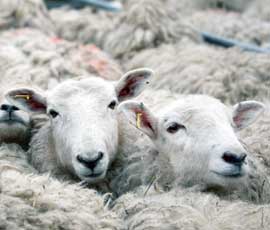UK Schmallenberg virus (SBV) cases rise to 11

Eleven confirmed cases of the Schmallenberg virus (SBV) have now been identified in the UK, Farmers Weekly can reveal.
DEFRA has confirmed that there are now four confirmed cases in Suffolk, three in Norfolk, two in Essex, one in East Sussex and one in Kent.
A spokesman for the Animal Health and Veterinary Laboratories Agency (AHVLA) said: “We have finished testing the latest samples received as a result of heightened vigilance for this new disease.
“Schmallenberg virus has now been identified in 11 submissions across the counties of Norfolk, Suffolk, Essex, Kent and East Sussex.
“These counties are in the area already identified as potentially at risk from infected midges being blown across the Channel from affected areas in Europe. We, therefore, suspect this to be the most likely cause of transmission.
“As surveillance continues and the lambing season progress we would expect further cases.”
Farm vet Toby Kemble, a partner at Wensum Valley Veterinary surgery, based in Fakenham, Suffolk, said he knew of at least two cases in the county that were likely among the confirmed cases.
“One case has already been confirmed in Suffolk, but there are a further two cases that have been tested which we believe will have it (SBV),” he told Farmers Weekly.
Sheep have been showing symptoms of severe limb contractures, badly twisted legs, and blindness, he said. In addition, some animals are stillborn or have died in the birthing process.
So far, Mr Kemble said he did not know of any suspected cases in the UK involving either cattle or goats.
However, he predicted that it was very likely that there would be more confirmed cases as the lambing season begins in earnest and calving begins in around a month.
“Other vets are seeing suspected cases and I think that in this region we are going to see more farmers affected than we have seen already,” he said.
Mr Kemble said the disease could spread further once the midge season starts.
“It might be that we get 20 cases in Norfolk and the disease fizzles out. But if some of those animals that are infected have the disease in them and the midge season starts, then it could spread countrywide.”
Mr Kemble said he was concerned that a vaccine for SBV was “at least 12 months away”.
“There is not going to be a vaccine available this year – people are working on that,” he added.
Two cases, one of which has yet to be confirmed, involve livestock farmers in Kent.
Alex Walters, associate director of Westpoint Veterinary Group’s surgery in Ashford, Kent, said: “We have got a couple of cases that are undergoing testing at the moment. I know that there are some concerns.”
He added: “I would be worried that most flocks have not started lambing yet and as and when they do, there is the propensity that the number of cases will increase.
“In addition, the evidence suggests that the virus is vector-borne and we are in a period now when the midge is not active.
“But as soon as the activity of the midge increases, then the transmission of the disease could become more active.”
He urged farmers to remain vigilant and report any symptoms of the disease to their farm vet immediately.
“If farmers get cattle, sheep and goats that they think are deformed, we can get these cases sent to the AHVLA or SAC for testing,” he said.
Jenny Pinker, a partner at the Oakwood Veterinary Group, in Norfolk, said three “highly suspicious” cases could be among cases confirmed in the county.
“They have all been lambs and they have been ewes that have died or have been deformed.”
Meanwhile, in continental Europe, the number of cases of SBV is increasing fast. Germany has 147 confirmed cases – a seven-fold increase in the last week. The Netherlands has 87 confirmed cases with 71 still under investigation. Belgium has recorded 62 incidences of the disease. However, France remains at two.
For more background and information go to our Schmallenberg dedicated page
Give your view on the situation on our Schmallenberg forum
